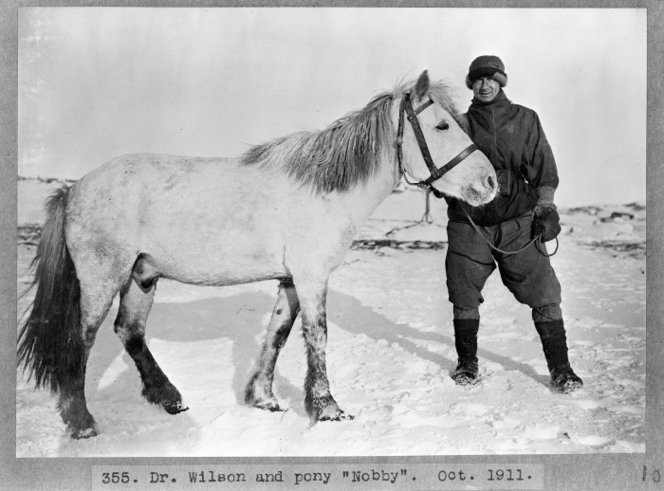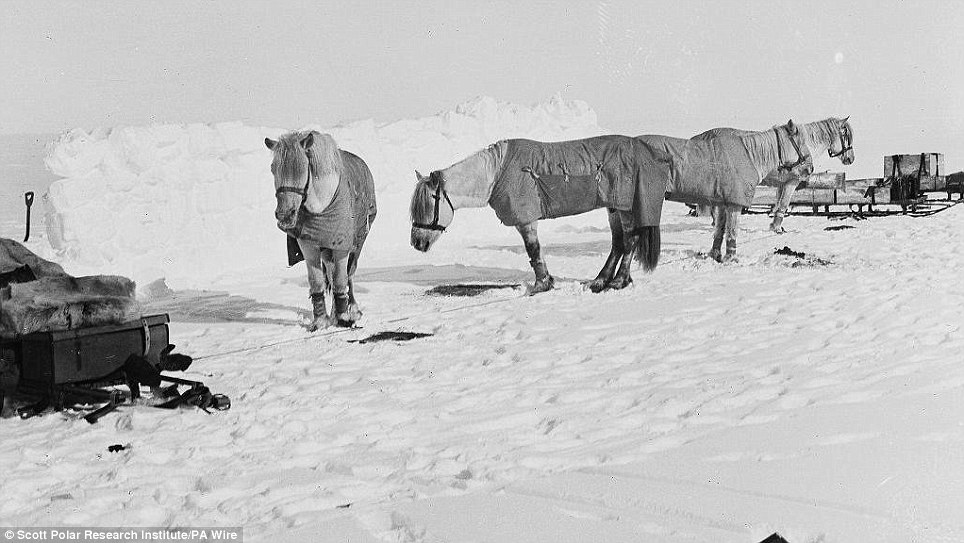

Link to Table of Contents

Scott had broken down the journey to the pole into three stages: The first stage was the 400 mile stretch across the permanently frozen southern part of the Ross Sea, known as the Ross Ice Shelf, the Great Barrier. (The Ross Ice Shelf butts up against the southern shore of Ross Island, including the southerner part of Camp Armitage on which "The Hut" was located. (See Map) "The Hut" seem to be a jumping-off spot.) The ice between the sea underneath and the surface was 150 feet thick (mean). The second stage was to climb the Transantarctic Mountain Range which laid across their path. They intended to go up a glacier (Beardmore Glacier) to the huge central plain of Antarctica where the south-pole was located. (See Map) The party would climb 120 miles up the Beardmore Glacier to an altitude of 10,000 feet above sea level. The third stage was to cover along the frozen central plain 350 miles to the Pole.
It was never intended, that all who started out would go the whole distance. Scott, and the three that he would select, at the last of it, would go with him on the final leg. So it was, that the party, by legs, was reduced in size as successive support teams were turned back.
Sixteen members of the expedition set off. The two, four cylinder gas sleighs had set out first, and, at the first of it, were well out ahead. Then the ponies, each led by a separate man, started out staggered in three groups. By November 4th, they were at Camp 2. with the groups coming in at different times. (Remember, that depots were set up the previous season 130 "The One Ton Depot," see Map.) As with the motor sleighs, Scott reported:
November 8th:
Cherry wrote at this time that there were "sixteen men, five tents, ten ponies, twenty-three dogs and thirteen sledges." The numbers were to change in the coming days. Back to Scott:
"Just after starting picked up cheerful note and saw cheerful notices saying all well with motors, both going excellently. [This splendid beginning did not last.] ... It appears they had a bad ground on the morning of the 29th [October]. ... Some 4 miles out we met a tin pathetically inscribed, 'Big end Day's motor No. 2 cylinder broken.' Half a mile beyond, as I expected, we found the motor, its tracking sledges and all. Notes from Evans and Day told the tale." In short one of the machines was broken and could not be fixed on the trail. "They had decided to abandon it and push on with the other alone. ... So the dream of great help from the machines is at an end!"49
As for the ponies:
"The ponies did pretty well ...
The party set up camp on November 6th, and, on account of a blizzard, were stormed stayed for two days. Scott wrote again about the ponies for whom he was much concerned:
It was pretty cold during the night, -7° when we camped, with a crisp breeze blowing. The ponies don't like it, but now, as I write, the sun is shining through a white haze, the wind has dropped, and the picketing line is comfortable for the poor beasts."
"We have done everything possible to shelter and protect them, but there seems no way of keeping them comfortable when the snow is thick and driving fast. We men are snug and comfortable enough, but it is very evil to lie here and know that the weather is steadily sapping the strength of the beasts on which so much depends. It requires much philosophy to be cheerful on such occasions."
As for the dogs: They were traveling along, initially, well behind the main group:
"In the midst of the drift this forenoon [November 7th] the dog party came up and camped about a quarter of a mile to leeward. Meares has played too much for safety in catching us so soon, but it is satisfactory to find the dogs will pull the loads and can be driven to face such a wind as we have had. It shows that they ought to be able to help us a good deal."
I might develop a narrative of the long trek, but I calculate it to be better to go with Scott's words as written (he was an entertaining writer); his words about the trials and tribulations as the men and the animals trudged hundreds of miles, averaging 10 miles per day, more or less, are worth reading directly.
"We are picking up last year's cairns with great ease, and all show up very distinctly. This is extremely satisfactory for the homeward march. What with pony walls, camp sites and cairns, our track should be easily followed the whole way. Everyone is as fit as can be. It was wonderfully warm as we camped this morning at 11 o'clock; the wind has dropped completely and the sun shines gloriously. Men and ponies revel in such weather. One devoutly hopes for a good spell of it as we recede from the windy northern region. The dogs came up soon after we had camped, travelling easily."
November 9th:
"Camp 6. ... we are going a little over 10 miles ... nightly. ... all the ponies are doing well. ... The dogs followed us so easily over the 10 miles that Meares thought of going on again, but finally decided that the present easy work is best.
November 11th:
Things look hopeful. The weather is beautiful -- temp. -12°, with a bright sun. ... The surface is hard; I take it about as good as we shall get."
"Camp 8. It is snowing again as we camp ... In spite of the surface, the dogs ran up from the camp before last, over 20 miles, in the night. They are working splendidly so far."
November 13th:
"Camp 10. Another horrid march in a terrible light, surface very bad. Ponies came through all well ... Evidently a good system of cairns is the best possible travelling arrangement on this great snow plain. Meares and Demetri up with the dogs as usual very soon after we camped."
November 15th:
"Camp 12. Found our One Ton Camp without any difficulty [130 miles from Cape Evans]. ... we had decided to give the animals a day's rest here, and then to push forward at the rate of 13 geographical miles a day. Oates thinks the ponies will get through, but that they have lost condition quicker than he expected. Considering his usually pessimistic attitude this must be thought a hopeful view.
November 24th:
A note from Evans dated the 9th, stating his party has gone on to 80° 30', carrying four boxes of biscuit. He has done something over 30 miles in 2 1/2 days -- exceedingly good going."
"Camp 20. ... the sun is very bright and warm. We did the usual march very easily over a fairly good surface, the ponies now quite steady and regular. Since the junction with the Motor Party the procedure has been for the man-hauling people to go forward just ahead of the crocks [they had a couple of old and tired ponies], the other party following 2 or 3 hours later. ... [as planned] this morning after the march poor old Jehu was led back on the track and shot."

November 25th:
"Camp 21. ... Now that it is pretty warm at night it is obviously desirable to work towards day marching. We shall start 2 hours later to-night and again to-morrow night.November 28th:
Last night we bade farewell to Day and Hooper ... All started together, the man-haulers, Evans, Lashly, and Atkinson, going ahead with their gear on the 10-ft. sledge. Chinaman and James Pigg [two of the ponies] next, and the rest some ten minutes behind.
The sun has been shining all night ... The ponies are slowly tiring, but we lighten loads again to-morrow by making another depôt. Meares has just come up to report that Jehu made four feeds for the dogs. He cut up very well and had quite a lot of fat on him. Meares says another pony will carry him to the Glacier. This is very good hearing. The men are pulling with ski sticks and say that they are a great assistance. I think of taking them up the Glacier. Jehu has certainly come up trumps after all, and Chinaman bids fair to be even more valuable. Only a few more marches to feel safe in getting to our first goal."
"Camp 24. [See Map] ... When will the wretched blizzard be over? ... Second march almost as horrid as the first [two marches a day with a lunch break in between]. Wind blowing strong from the south ... we could see little or nothing, and the driving snow hit us stingingly in the face. ... dirty weather ... These last four marches have been fought for ...November 29th:
Chinaman, 'The Thunderbolt,' has been shot to-night. Plucky little chap, he has stuck it out well and leaves the stage but a few days before his fellows. We have only four bags of forage (each one 30 lbs.) left, but these should give seven marches with all the remaining animals, and we are less than 90 miles from the Glacier. ... The land doesn't show up yet."
"Camp 25. Things much better. The land showed up late yesterday ... About 7 1/2 hours on the [last] march. I suppose our speed throughout averages 2 stat. miles an hour.November 30th:
... the sun very warm and bright. Land shows up almost ahead now, our pony goal less than 70 miles away. The ponies are tired, but I believe all have five days' work left in them, and some a great deal more. Chinaman made four feeds for the dogs, and I suppose we can count every other pony as a similar asset. ... Snippets and Nobby now walk by themselves, following in the tracks well. Both have a continually cunning eye on their driver, ready to stop the moment he pauses. They eat snow every few minutes. ... the animal's vagaries, his everlasting attempts to eat his head rope, &c. Yet all these animals are very full of character. Some day I must write of them and their individualities.
... everyone is in excellent spirits. ... In Bowers' tent they had some of Chinaman's undercut in their hoosh [a thick soup] yesterday, and say it was excellent."
"Camp 26. A very pleasant day for marching, but a very tiring march for the poor animals, which, with the exception of Nobby, are showing signs of failure all round. ... the loads are light now and there are still eight animals left ... The dogs are reported as doing very well. ... I had taken a couple of photographs."December 1st:
"Camp 27. ... to-night against some opinion I decided Christopher must go. He has been shot ... Here we leave a depôt so that no extra weight is brought on the other ponies."December 2nd:
"Camp 28. ... I took several photographs of the ponies plunging along ... Sad to have to order Victor's end -- poor Bowers feels it. He is in excellent condition and will provide five feeds for the dogs. ... The dogs are doing splendidly and will take a heavier load from to-morrow. ... a fine day has been the exception so far. ... It was so warm when we camped that the snow melted as it fell, and everything got sopping wet. Oates came into my tent yesterday, exchanging with Cherry-Garrard.December 3rd:
The lists now: Self, Wilson, Oates, and Keohane. Bowers, P.O. Evans, Cherry and Crean.
Man-haulers: E. R. Evans, Atkinson, Wright, and Lashly. We have all taken to horse meat and are so well fed that hunger isn't thought of."
"Camp 29. Our luck in weather is preposterous. ... at breakfast the wind increased, and by 4.30 it was blowing a full gale from the south. The pony wall blew down, huge drifts collected, and the sledges were quickly buried. ... The changes of conditions are inconceivably rapid, perfectly bewildering. In spite of all these difficulties we have managed to get 11 1/2 miles south and to this camp at 7 P.M.-the conditions of marching simply horrible. ... We steered with compass ... It is really time the luck turned in our favour -- we have had all too little of it."December 4th:
Camp 29. Blizzard conditions. "... it makes me feel a little bitter to contrast such weather with that experienced by our predecessors."
They pushed on to Camp 30. "The ponies marched splendidly to-day ... They must be in very much better condition than Shackleton's animals, and indeed there isn't a doubt they would go many miles yet if food allowed. The dogs are simply splendid, but came in wanting food, so we had to sacrifice poor little Michael, who, like the rest, had lots of fat on him. All the tents are consuming pony flesh and thoroughly enjoying it."

"Camp 30. [See Map] Noon. We awoke this morning to a raging, howling blizzard. ... After a minute or two in the open one is covered from head to foot. The temperature is high, so that what falls or drives against one sticks. The ponies—head, tails, legs, and all parts not protected by their rugs—are covered with ice; the animals are standing deep in snow, the sledges are almost covered, and huge drifts above the tents. We have had breakfast, rebuilt the walls, and are now again in our bags. One cannot see the next tent, let alone the land. ... I doubt if any party could travel in such weather even with the wind, certainly no one could travel against it. ...December 6th:
The snow is all melting and everything's afloat, If this goes on much longer we shall have to turn the tent upside down and use it as a boat.
"Camp 30. Noon. Miserable, utterly miserable. We have camped in the 'Slough of Despond.' The tempest rages with unabated violence. ... everything in the tent is soaking. ... We are very, very wet."

December 7th:
"Camp 30. The storm continues and the situation is now serious. ... I can find no sign of an end, and all of us agree that it is utterly impossible to move. ... [And this is] December -- our finest month ... It is very evil to lie here in a wet sleeping-bag and think of the pity of it, whilst ... things go steadily from bad to worse. Meares has a bad attack of snow blindness in one eye. ... There cannot be good cheer in the camp in such weather, but ... last night one heard laughter.December 8th [See Map]:
...Surely few situations could be more exasperating than this of forced inactivity when every day and indeed one hour counts. To be here watching the mottled wet green walls of our tent, the glistening wet bamboos, the bedraggled sopping socks and loose articles dangling in the middle, the saddened countenances of my companions -- to hear the everlasting patter of the falling snow and the ceaseless rattle of the fluttering canvas -- to feel the wet clinging dampness of clothes and everything touched, and to know that without there is but a blank wall of white on every side -- these are the physical surroundings."
"Camp 30. Hoped against hope for better conditions, to wake to the mournfullest snow and wind as usual. We had breakfast at 10, and at noon the wind dropped. We set about digging out the sledges, no light task. We then shifted our tent sites. ... The re-setting of the tent has at least given us comfort, especially since the wind has dropped. ... Alas! as I write the sun has disappeared and snow is again falling.December 9th:
... Oh! for fine weather ... The temperature remains 33°, and everything is disgustingly wet. ... The poor ponies look wistfully for the food of which so very little remains, yet they ... look wonderfully fit, all things considered. Everything looks more hopeful to-night, but nothing can recall four lost days."
"Camp 31 [Shambles Camp]. I turned out two or three times in the night to find the weather slowly improving; at 5.30 we all got up, and at 8 got away with the ponies -- a most painful day. ... We went on all day without lunch. ... the awful softness of the snow. ...
At 8 P.M. the ponies were quite done, one and all. ... We camped, and the ponies have been shot. Poor beasts! they have done wonderfully well considering the terrible circumstances under which they worked ... The dogs are going well in spite of the surface ... I cannot load the animals heavily on such snow. ... In spite of some doubt in our outlook, everyone is very cheerful to-night and jokes are flying freely around."
Or, GO TO
TABLE OF CONTENTS
Found this material Helpful?
Peter Landry
2013